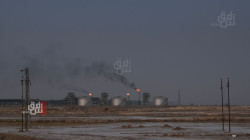Oil falls on weak China demand concerns, Mideast ceasefire talks

Shafaq News/ Oil prices eased on Thursday as concerns over weak demand in China, the world's largest crude importer, and expectations of a nearing ceasefire deal in the Middle East overcame gains in the previous session after draws in U.S. inventories.
Brent crude futures for September fell 63 cents, or 0.8%, to $81.08 a barrel by 0355 GMT. U.S. West Texas Intermediate crude for September slid 63 cents, or 0.8%, to $76.96 per barrel.
Both benchmarks settled higher on Wednesday, snapping consecutive sessions of declines after the Energy Information Administration said U.S. crude inventories fell by 3.7 million barrels last week. That compared with analysts' expectations in a Reuters poll for a 1.6-million-barrel draw.
U.S. gasoline stocks dropped by 5.6 million barrels, compared with analysts' expectations for a 400,000 draw. Distillate stockpiles fell by 2.8 million barrels versus expectations for a 250,000-barrel increase, the EIA data showed.
"Despite draws in U.S. crude and gasoline stocks, investors remained wary about weakening demand in China and expectations of advancing ceasefire talks between Israel and Hamas added to pressure," said Hiroyuki Kikukawa, president of NS Trading, a unit of Nissan Securities.
This year, China's oil imports and refinery runs have trended lower than in 2023 on weaker fuel demand amid sluggish economic growth, according to government data.
Slumping U.S. stock markets also reduced traders' risk appetite, Kikukawa added. All three main indexes on Wall Street ended lower on Wednesday.
In the Middle East, efforts to reach a ceasefire deal to end the war in the Gaza Strip between Israel and militant group Hamas under a plan outlined by U.S. President Joe Biden in May and mediated by Egypt and Qatar have gained momentum over the past month.
On Wednesday, Israeli Prime Minister Benjamin Netanyahu sketched a vague outline of a plan for a "deradicalized" post-war Gaza in a speech to U.S. Congress and touted a potential future alliance between Israel and America's Arab allies.
"If Middle East ceasefire talks progress, U.S. equities continue to slide, and China's economy remains sluggish, oil prices could fall to early June levels," said Satoru Yoshida, a commodity analyst with Rakuten Securities.
Additionally, clarity on U.S. interest rate cuts is missing, said Phillip Nova analyst Priyanka Sachdeva, who does not expect robust demand given China's economic recovery has been poor.
The U.S. Federal Reserve is expected to cut rates just twice this year, in September and December, according to a Reuters poll of economists, as resilient U.S. consumer demand warrants a cautious approach despite easing inflation.
Lower interest rates should spur economic growth, leading to more oil consumption.
(Reuters)





